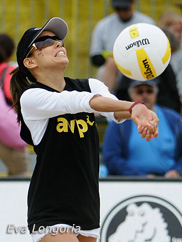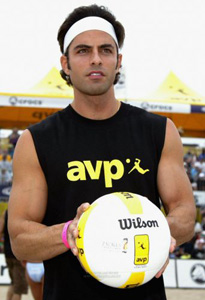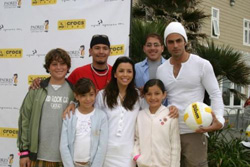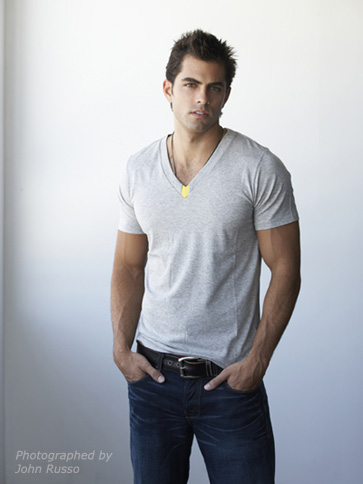Having moved here from El Salvador just two short years ago, Adrian Bellani has accomplished more than some who’ve lived here their entire lives. He has a successful acting career as the character Miguel Lopez-Fitzgerald on the soap opera Passions, and he gives back to the Hispanic community as an ambassador of PADRES Contra El Cáncer (Parents against Cancer)—a charity that aids lower income children and their families who suffer from cancer. Adrian just recently spearheaded a fundraiser in May, which raised quite a bit of money for the charity. Eva Longoria (the national spokesperson for PADRES), ambassadors Adrian Bellani, Matt Cedeno, Cristian de la Fuente, and Angelica Castro, along with comedian Carlos Mencia, Actor Amaury Nolasco, and many other celebrities played to raise money and awareness for PADRES Contra El Cáncer at the May 20th “Spike for HOPE” Celebrity Beach Volleyball Match in Hermosa Beach.
suffer from cancer. Adrian just recently spearheaded a fundraiser in May, which raised quite a bit of money for the charity. Eva Longoria (the national spokesperson for PADRES), ambassadors Adrian Bellani, Matt Cedeno, Cristian de la Fuente, and Angelica Castro, along with comedian Carlos Mencia, Actor Amaury Nolasco, and many other celebrities played to raise money and awareness for PADRES Contra El Cáncer at the May 20th “Spike for HOPE” Celebrity Beach Volleyball Match in Hermosa Beach.
I’m very passionate about what I do, very spiritual, and I’m very positive. I have a very positive outlook on life.
—Adrian Bellani—
How long have you been acting?
Paid acting, I guess since I started Passions, which was only a year and a half ago, which is not long at all. Time has flown. I’ve only been out in California for two years. I have never taken acting class. I have no experience whatsoever before this.
How did you get the role as Miguel Lopez-Fitzerald?
I was very blessed and I was very lucky. My agents called me up and told me there was this audition they wanted to send me out on, and they really thought that the breakdown was similar to me as far as the description of the character. I went in and totally nailed it and … I’m here today.
Wow! Congratulations. So, let’s talk about some of the other interesting things that happen in your life. Tell me about PADRES.
I’m very much involved with PADRES Contra El Cáncer. It’s an organization which helps improve the quality of life for Latino children and their families. I say Latino because the majority of the kids we take care of are Latinos, although we are an organization that takes care of any child, from the ages of zero to twenty-one, and no family is turned away. Doesn’t matter what race, what ethnicity, what origin … doesn’t matter.
majority of the kids we take care of are Latinos, although we are an organization that takes care of any child, from the ages of zero to twenty-one, and no family is turned away. Doesn’t matter what race, what ethnicity, what origin … doesn’t matter.
We take in a family and provide an individual plan for [them], catering to the child and his or her family’s educational, economical, and emotional needs. Over 70% of the families that come in, their annual income is under $20,000, which isn’t a lot of money to have a child go through cancer treatment. An organization like this really provides these kids and their families what they need to survive, whether it’s grocery or transportation vouchers, just classes, or daycare. PADRES is a family organization. It doesn’t only help the child, we really cater to the family. This is important because when you have a child or when you have any family member going through something so serious like cancer treatments, you know we’re all in the same boat together, and we all have to survive it together. They all have to be there for one another, and this organization does some amazing things.
Is this pretty much nationwide?
Right now we have our offices here in Los Angeles, pretty much work in the Los Angeles county area, but I think the long-term goal is to go nationwide one day.
How long has the organization been around?
PADRES Contra El Cáncer has been around since 1985.
What was it that made you really immerse yourself into this?
About a year ago, I met the CEO of ALMA through another ambassador of PADRES, and he really [spoke] passionately about his job and the organization. I was just drawn to it, and  cancer has been in my family for years. My grandmother had breast cancer. My aunt had breast cancer, and my little cousin when he was ten, was diagnosed with cancer of the esophagus. I felt like it was something that I needed to do—you know, really try to help out these kids.
cancer has been in my family for years. My grandmother had breast cancer. My aunt had breast cancer, and my little cousin when he was ten, was diagnosed with cancer of the esophagus. I felt like it was something that I needed to do—you know, really try to help out these kids.
What does the money that goes towards these children do specifically?
Every so often, families with diagnosed children come in and they are provided classes so that they will understand what their child is going through, know what type of treatment they’re getting, and know how to take care of their kids throughout those treatments. It’s amazing. It’s beautiful. And the people, the staff, and the hospital, it’s just out of this world. I’m very close to everybody.
I commend you. That’s a big thing to take on. I understand that you tried to donate some shoes for hurricane Katrina victims. Can you tell me a little bit about that experience?
It just makes me irritated just to think of it again. Well, when Katrina hit and devastated the entire city of New Orleans, I saw all this stuff on television, and it was sad to see people weren’t really helping out at the time. I would like to mention that I was not onPassions at the time. I was pretty much a struggling actor and working at J. Crew, folding clothes until two or three o’clock in the morning. But I really wanted to help these people out somehow. It was just so sad to see that nobody was really doing anything—and I have access to this shoe company in El Salvador and they were willing to donate $500,000 worth of shoes that would be provided to the Katrina victims. These people had obviously lost not only their homes, but all of their possessions, too. $500,000 worth of shoes is a lot of shoes, and whether or not you could provide shoes for every victim or not, you could possibly provide shoes to every child and every female. I did everything I could to get in touch with the people I could talk to to actually tell them this is what I have and this is what I want to donate. How can we do this? Nobody, and I mean NOBODY cared. Absolutely nobody. I called so many people that I felt I could reach out to and say this is what I have, and this is what I want to do, and this is what I want to offer, and nobody even cared. El Salvador has the second largest U.S. embassy in the world, and we even called the U.S. embassy. They told us—and this was word for word—: “At the moment we are only accepting money. We do not accept anything else.” So you couldn’t give them clothes. You couldn’t give them towels. You couldn’t give them anything. All they wanted was money. At least that is what they told me.
How long after Katrina hit was this? Was it a week? Was it a month?
This was within the first month. It was really unbelievable. I don’t know, I guess I have to be Angelina Jolie or something to actually get some attention. It’s sad. You know people—just the normal citizen and the normal person at the time—wanted to help out, and nobody gave a crap about it. I’m sorry for the victims.
I’m sorry that happened, or should I say didn’t happen because it kind of makes a person jaded.
I was really upset for a while. And it was just unfortunate that the U.S. government would actually say something like that, too: “We’re not accepting any type of donations unless it’s monetary.”
I think every actor should be able to give back and do something. We’re so much in the public eye and we make so much money, you know it’s sad to see the people who are very well off and do nothing to give back.
If you had been on Passions back then, having some celebrity status, do you think it would have made a difference?
I honestly don’t know. I’m on a soap opera. It’s a great job and it’s a great career to have. But then again it is not a career like a Sean Penn or Angelina Jolie or somebody like that. I would never have the connections like somebody like they would have, having a company that actually wanted to donate half a million dollars in shoes. That’s pretty good right there.
What’s next for you?
As an actor I think there’s a bright future ahead of me. I think there are a lot of things coming my way. Hopefully, I will be able to keep working and giving back to my community and to PADRES Contra El Cáncer.
One day I want to start a foundation in El Salvador, and from that money, provide scholarships to certain kids. I want to take them out of public schools and put them into private schools and give them education throughout their life. I think something like that would be very important, especially in a country like mine where it’s a poor country.
Education is probably the most important thing for a country—for a nation in general. You pretty much have to educate one generation. And it’s done after that. With education, I think a country does better—an economy does better—families do better—kids do better.
To find out more about PADRES Contra El Cáncer, visit their website at www.iamhope.org. Also visit Adrian’s website atwww.adrianbellini.net and www.officialadrianbellani.com.
Interviewed by Kaylene Peoples
Transcribed by Tamara Baskin and Lisa Trimarchi
